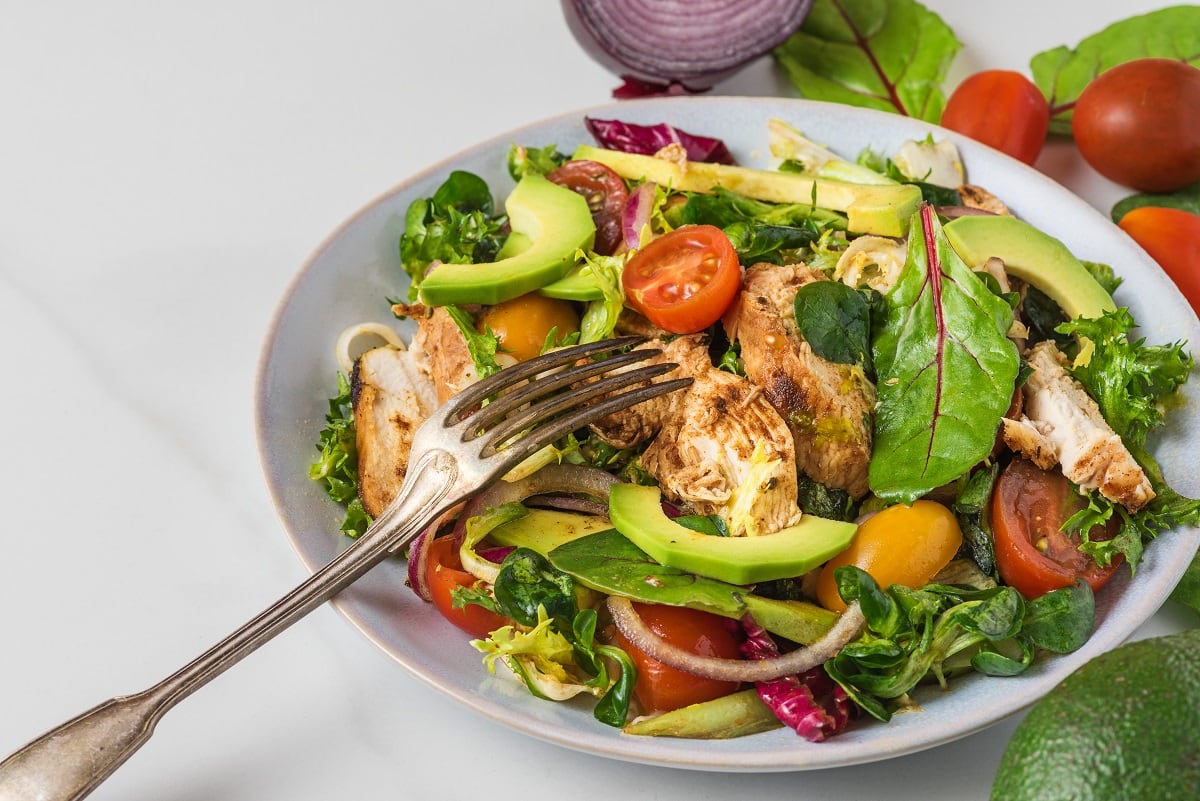A consistent finding of Healthier and more sustainable diets: what changes are needed in high-income countries is that achieving healthier and sustainable diets requires a shift to more plant-derived foods. These would include vegetables, fruit, wholegrains, beans and other pulses, nuts and seeds, and plant-based meat alternatives offering essential nutrients lower in salt and saturated fat.
The paper confirms moderating red meat and processed meat consumption would be healthier, but animal products need not be avoided completely to eat healthily and more sustainably. It suggests the Eatwell Guide is a good starting point for a balanced diet.
While vegetarian and vegan diets can reduce greenhouse gas emissions and land use associated with food production, the review highlights they are unlikely to be widely adopted. They may also reduce intakes and/or bioavailability of some essential nutrients found in foods such as meat, fish, milk and eggs, for example iron, zinc, calcium, iodine, and vitamin B12.
A balance of dietary and environmental factors could still achieve a 30% reduction in greenhouse gas emissions within the food chain, the review states.
Don't focus solely on protein
Substitutes for products of animal origin were often purely assessed on the basis of their protein content, but their whole nutritional profile should be considered, the study states.
Food Manufacture spoke to co-author of the paper Simon Steenson.
Q: What was the main purpose of this study?
A: "There's still a lot of debate around what should and should not be contained in a healthy and sustainable diet. It's important that nutrition is central to these discussions and is considered alongside conversations which might be getting driven more by environmental needs. We have a climate crisis and we need to address the environmental aspect of our diet, but we shouldn't forget nutrition within that."
Q: Is the hope that the Government will take a look at this in terms of its response to the National Food Strategy?
A: "We are considering how we can share and amplify the findings. In terms of making recommendations to Government, that's not something we would typically do from a lobbying perspective as a charity. Of course, we hope these findings will be taken up by as many different people as possible."
Q: Isn't there a danger that in trying to pursue the perfect diet, we rule out what should be top priority and 'fiddle while Rome burns'? A 30% reduction in greenhouse gas emissions sounds impressive, but in order to meet net zero are we not going to have to overhaul our complete food system?
A: "We do need large and urgent changes to food systems on the production and consumption side, but this is a rapidly evolving and emerging area in terms of published research. The hope is production opportunities for mitigating impact alongside gradual dietary shifts can be a sensible direction of travel towards where we need to be in terms of diets.
"One or two commentators have said it's probably unlikely we could achieve net zero for our food system in the same way as, for example, transport or energy generation. What we have recommended here is the Eatwell Guide is a sensible direction of travel.
"In the paper, we have a section around how dietary guidelines fit in terms of meeting the 1.5oC [global warming ceiling] and other environmental goals. There is research showing they might not be enough at the moment, but if we can push people more in this direction the dietary guidelines can be revised at a later date."
Q: What practical lessons do you consider there to be for the food industry from this review in terms of product development?
A: "There's a need to consider the overall nutritional profile of plant-based alternatives, in terms of nutrients to limit, such as saturated fat and salt and important essential micronutrients that animal-based foods provide. One that might not be on people's radar is iodine. There are one or two studies out of [the University of] Surrey in the UK showing people from the National Diet & Nutrition Survey that only consume plant-based milk alternatives were slightly deficient in terms of iodine status, whereas those consuming milk were not."
Q: Is every consumer following the Eatwell Guide? How can the insights from this study trickle down to the consumer?
A: "Knowing the guidance we have had in place for some time, we can try to amplify that and try to find ways people can shift more towards this. One point that seems to have had a lot of interest around the review is discretionary foods - or HFSS [high fat, salt, sugar] - messaging around potential win-wins for foods people already know are not particularly healthy to include in their diet. We know we should limit them, but that can be a win-win in terms of not just health but also the environment."
Q: While excluding animal-based foods seems unacceptable to most people, if consumption of those foods was cut below a certain level, large-scale production of such foods would become cost-prohibitive and wouldn't that therefore argue for a shift to smaller local supply as a total model?
A: "There's a need for more integrative thinking and modelling around food systems. That's something that's starting to emerge now. UK Research and Innovation have recently had a very large call on this around innovative research to transform food systems in the UK. One thing we would stress within that is that it should be multidisciplinary and that will help how studies are done and how considerations are balanced, but nutrition and nutritionists need to play a bigger part in that."
Q: Is there scope for GM to improve the nutritional benefits of foods such as rice in terms of bioavailability?
A: Yes. That's within our research recommendations. We do have more information on that about the potential of biofortification to improve the nutrient profile of crops. It's important for these avenues to be explored, but obviously there are regulatory and ethical concerns around this. Another one is around omega-3s. We have recommendations for oily fish to satisfy this important need for omega-3s, but there are alternative sources that are being explored and trialled that are transgenic. It's difficult to know what role that may play and perhaps there's a large amount of pushback from consumers and regulatory bodies."
Q: Is there scope for a mandatory labelling scheme combining greenhouse gas emissions with nutritional elements as a single score or colour?
A: "There are eco-labelling schemes that are going to be trialled soon. There's one that has been introduced elsewhere in Europe. There's a plan for an eco-score from autumn onwards being trialled. It's a very interesting question how that could be combined with nutrition and if it isn't and we have traffic light labelling sitting next to an eco-score, does that reinforce decisions or does that confuse the consumer?"
Judy Buttriss, director general of the BNF and co-author of the review, said: “Looking at the available evidence we recommend that an obvious step is to work together with others in the field of nutrition and beyond to promote diets aligned with the UK’s Eatwell Guide."
"An advantage of this kind of plant-rich diet, which can still include some meat, fish, dairy products and eggs, is that it is based on dietary patterns already familiar in the UK and already being adopted to some extent by many of us. However, currently less than 1% of people are achieving all of the Eatwell Guide recommendations, and so there is room for improvement for almost all of us.”
The review has been published online here: https://doi.org/10.1111/nbu.12518 and will be printed in the September issue of Nutrition Bulletin.
BNF tips for healthier and more sustainable diets
- Follow the Eatwell Guide
- Eat more fruit and vegetables
- Switch to more plant-based sources of protein
- Limit high fat, salt or sugar foods
- Choose sustainable sources of fish and seafood
- Waste less food




